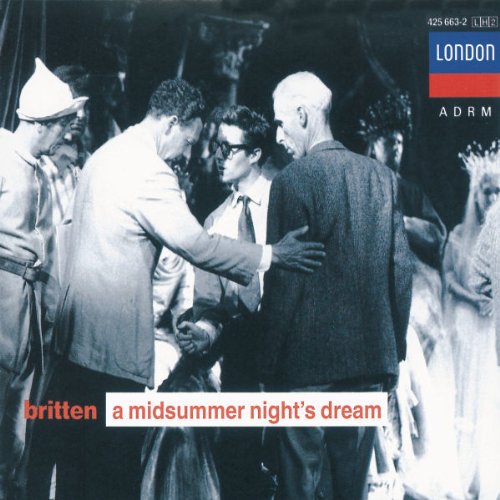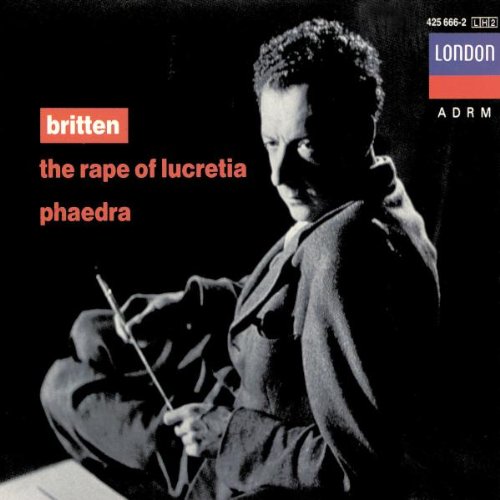Britten Midsummer Night's Dream
View record and artist detailsRecord and Artist Details
Composer or Director: Benjamin Britten
Genre:
Opera
Label: London
Magazine Review Date: 5/1990
Media Format: CD or Download
Media Runtime: 144
Mastering:
ADD
Catalogue Number: 425 663-2LH2

Tracks:
| Composition | Artist Credit |
|---|---|
| (A) Midsummer Night's Dream |
Benjamin Britten, Composer
Alfred Deller, Oberon, Alto Benjamin Britten, Composer Benjamin Britten, Conductor David Kelly, Snug, Bass Downside School Boys' Choir Elizabeth Harwood, Tytania, Soprano Emanuel School Boys' Choir Gordon Clark, Moth, Treble/boy soprano Heather Harper, Helena, Soprano Helen Watts, Hippolyta, Contralto (Female alto) Ian Wodehouse, Mustardseed, Treble/boy soprano John Prior, Peaseblossom, Treble/boy soprano John Shirley-Quirk, Theseus, Bass Josephine Veasey, Hermia, Mezzo soprano Keith Raggett, Starveling, Baritone Kenneth MacDonald, Flute, Tenor London Symphony Orchestra Norman Lumsden, Quince, Bass Owen Brannigan, Bottom, Baritone Peter Pears, Lysander, Tenor Richard Dakin, Cobweb, Treble/boy soprano Robert Tear, Snout, Tenor Stephen Terry, Puck, Speaker Thomas Hemsley, Demetrius, Baritone |
Composer or Director: Benjamin Britten
Genre:
Opera
Label: London
Magazine Review Date: 5/1990
Media Format: CD or Download
Media Runtime: 145
Mastering:
ADD
Catalogue Number: 425 669-2LH2

Tracks:
| Composition | Artist Credit |
|---|---|
| Death in Venice |
Benjamin Britten, Composer
Benjamin Britten, Composer English Chamber Orchestra English Opera Group Chorus Iris Saunders, Strawberry Seller James Bowman, Voice of Apollo, Alto John Shirley-Quirk, Leader of the Players, Baritone John Shirley-Quirk, Voice of Dionysus, Baritone John Shirley-Quirk, Voice of Dionysus, Baritone John Shirley-Quirk, Hotel Manager; Hotel Barber, Baritone John Shirley-Quirk, Leader of the Players, Baritone John Shirley-Quirk, Traveller; Elderly Fop; Old Gondolier, Baritone John Shirley-Quirk, Hotel Manager; Hotel Barber, Baritone John Shirley-Quirk, Traveller; Elderly Fop; Old Gondolier, Baritone Kenneth Bowen, Hotel Porter, Tenor Neville Williams, Boy Player Penelope Mackay, Girl Player Peter Leeming, English Clerk, Baritone Peter Pears, Gustav von Aschenbach, Tenor Steuart Bedford, Conductor |
Composer or Director: Benjamin Britten
Genre:
Opera
Label: London
Magazine Review Date: 5/1990
Media Format: CD or Download
Media Runtime: 124
Mastering:
ADD
Catalogue Number: 425 666-2LH2

Tracks:
| Composition | Artist Credit |
|---|---|
| (The) Rape of Lucretia |
Benjamin Britten, Composer
Benjamin Britten, Conductor Benjamin Britten, Composer Benjamin Luxon, Tarquinius, Baritone Bryan Drake, Junius, Baritone Elizabeth Bainbridge, Bianca, Mezzo soprano English Chamber Orchestra Heather Harper, Female Chorus, Mezzo soprano Janet Baker, Lucretia, Mezzo soprano Jenny Hill, Lucia, Soprano John Shirley-Quirk, Collatinus, Bass Peter Pears, Male Chorus, Tenor |
| Phaedra |
Benjamin Britten, Composer
Alicia Slowakiewicz, Atalanta Barbara Nowicka, Asteria Benjamin Britten, Composer English Chamber Orchestra Ewa Ignatowicz, Nice Halina Górzynska, Meleagro Hans Hotter, Wotan, Alto Janet Baker, Mezzo soprano Kazimierz Myrlak, Tirsi Lauritz Melchior, Siegmund, Tenor Lidia Juranek, Climene Steuart Bedford, Conductor |
Composer or Director: Benjamin Britten
Genre:
Opera
Label: London
Magazine Review Date: 5/1990
Media Format: CD or Download
Media Runtime: 105
Mastering:
Mono
ADD
Catalogue Number: 425 672-2LH2

Tracks:
| Composition | Artist Credit |
|---|---|
| (The) Turn of the Screw |
Benjamin Britten, Composer
Arda Mandikian, Miss Jessel, Soprano Benjamin Britten, Conductor Benjamin Britten, Composer David Hemmings, Miles, Treble/boy soprano English Opera Group Orchestra Jennifer Vyvyan, Governess, Soprano Joan Cross, Mrs Grose, Soprano Olive Dyer, Flora, Soprano Peter Pears, Peter Quint, Tenor Peter Pears, Prologue, Tenor Peter Pears, Peter Quint, Tenor Peter Pears, Prologue, Tenor |
Author:
Will there, I wonder, ever be a better performance, let alone recording, of The Turn of the Screw than this by the original cast, recorded less than four months after the 1954 Venice premiere? I have heard and seen a good many since, but none has approached it. Christopher Palmer contributes a stimulating essay to the booklet with this reissue, in which he faces squarely all the implications of this choice of subject by Britten as far as what Palmer calls his ''intellectual paedophilia'' is concerned. It is a valid and provocative comment, a useful contribution to the growing body of Britten criticism.
This score is Britten at his greatest, expressing good and evil with equal ambivalence, evoking the tense and sinister atmosphere of Bly by inspired use of the chamber orchestra and imparting vivid and truthful life to every character in the story. As one listens, transfixed, all that matters is Britten's genius as a composer.
Jennifer Vyvyan's portrayal of the Governess is a classic characterization, her vocal subtleties illuminating every facet of the role and she has the perfect foil in Joan Cross's motherly and uncomplicated Mrs Grose. The glittering malevolence of Pears's Quint, luring David Hemmings's incomparable Miles to destruction; the tragic tones of Arda Mandikian's Miss Jessel; Olive Dyer's spiteful Flora—how fortunate we are that these performances are preserved.
Palmer also has pertinent things to say about the sexual climate of Britten's last opera, Death in Venice; but again these seem to become of less consequence as one listens to the music. Its potency and inventiveness create this opera's disturbing and intense atmosphere, each episode heightened dramatically by instrumental colouring. Steuart Bedford's conducting avoids any tendency towards the episodic as a result of the quick succession of scenes: under his direction each scene is fully integrated into a fluent and convincing whole.
This recording was made in 1973 while Britten was very ill and, as Donald Mitchell has related in an essay in the Cambridge University Press handbook on the opera, it omits Aschenbach's first recitative (''I have always kept a close watch over my development as a writer... ''), given as an optional cut in the vocal score, which was published after the recording was made, by which time Britten had changed his mind about this cut and wished it had been included in the recording. Pears's Aschenbach, a very English conception, is a masterly performance, matched by John Shirley-Quirk's assumption of the six characters who are Aschenbach's messengers of death and the Voice of Dionysus.
The recording of The Rape of Lucretia was not made until 1970, nearly 25 years after the first performances at Glyndebourne, so that apart from Pears as the Male Chorus none of the original cast sings in it. But archival recordings do exist in which the first Lucretias, Kathleen Ferrier and Nancy Evans, may be heard. This was Britten's first chamber opera, and it is his orchestral scoring, particularly the use of harp and low woodwind, that is its principal virtue. Listening to a recording, without the visual element, tends to expose the self-consciously 'poetic' parts of Ronald Duncan's libretto and the fact that Lucretia herself never really stirs our emotions, not even in so sympathetic a performance as Dame Janet Baker's. The male singers— Shirley-Quirk, Luxon, Bryan Drake and, of course, Pears—are all trusted Brittenites. As a fill-up, the cantata Britten wrote for Dame Janet in 1975, the unlovable Phaedra, is an intelligent choice.
If I had to name Britten's greatest opera, I should still hover between three, finally (I think) opting for Billy Budd. But I would have no hesitation in selecting
Alfred Deller's unmatched Oberon, Owen Brannigan's Bottom, Thomas Hemsley's Demetrius, Norman Lumsden's Quince and David Kelly's Snug are the only survivors on record from the 1960 first performances. Sir Peter Pears sang Flute then but moved to Lysander on record, a pity, I think, for his comic impersonations were at once subtle and funny. Elizabeth Harwood's Tytania is a lovely performance, both warm and unearthly. Triumphant transfers in all cases.'
Discover the world's largest classical music catalogue with Presto Music.

Gramophone Digital Club
- Digital Edition
- Digital Archive
- Reviews Database
- Full website access
From £8.75 / month
Subscribe
Gramophone Full Club
- Print Edition
- Digital Edition
- Digital Archive
- Reviews Database
- Full website access
From £11.00 / month
Subscribe
If you are a library, university or other organisation that would be interested in an institutional subscription to Gramophone please click here for further information.





